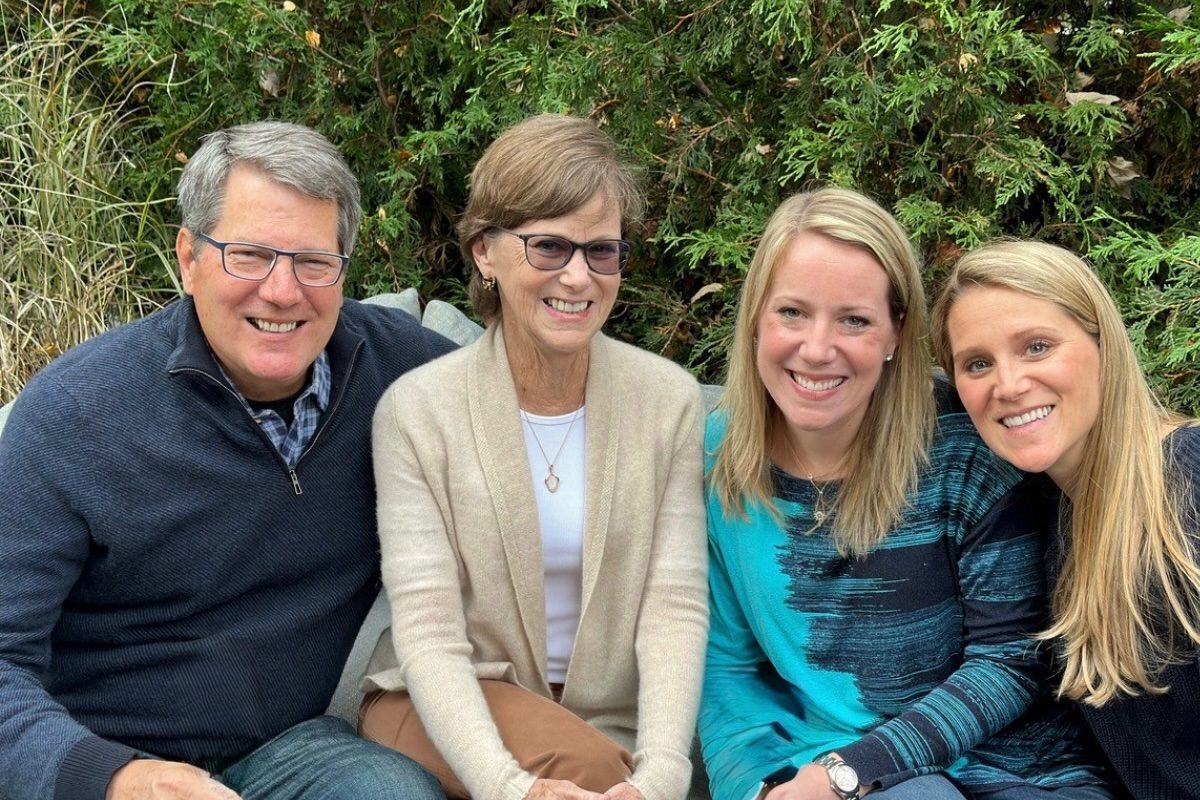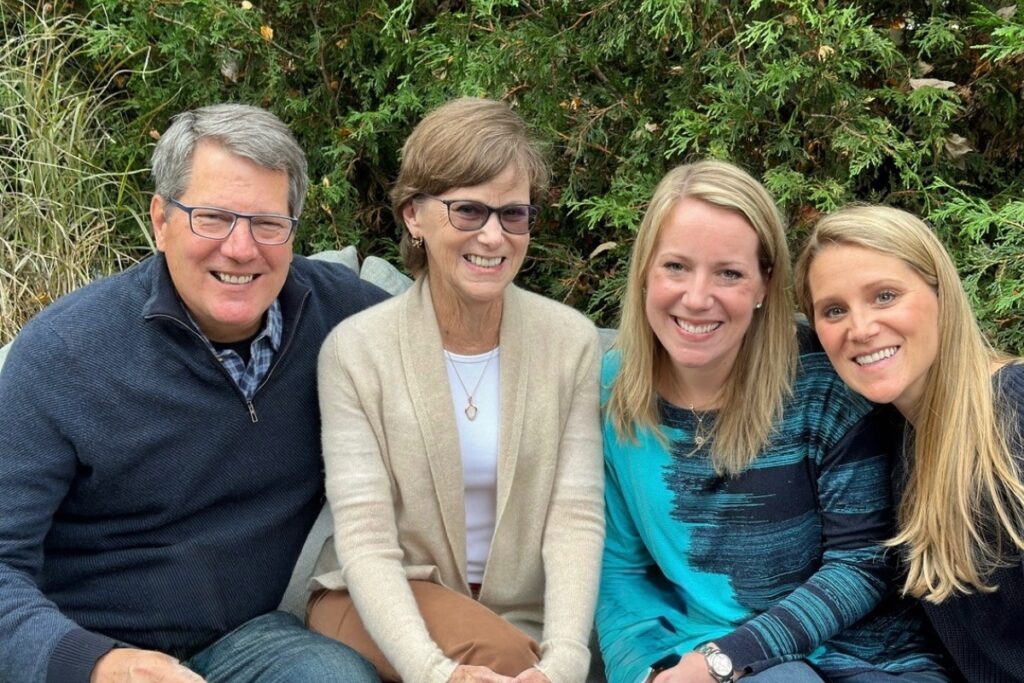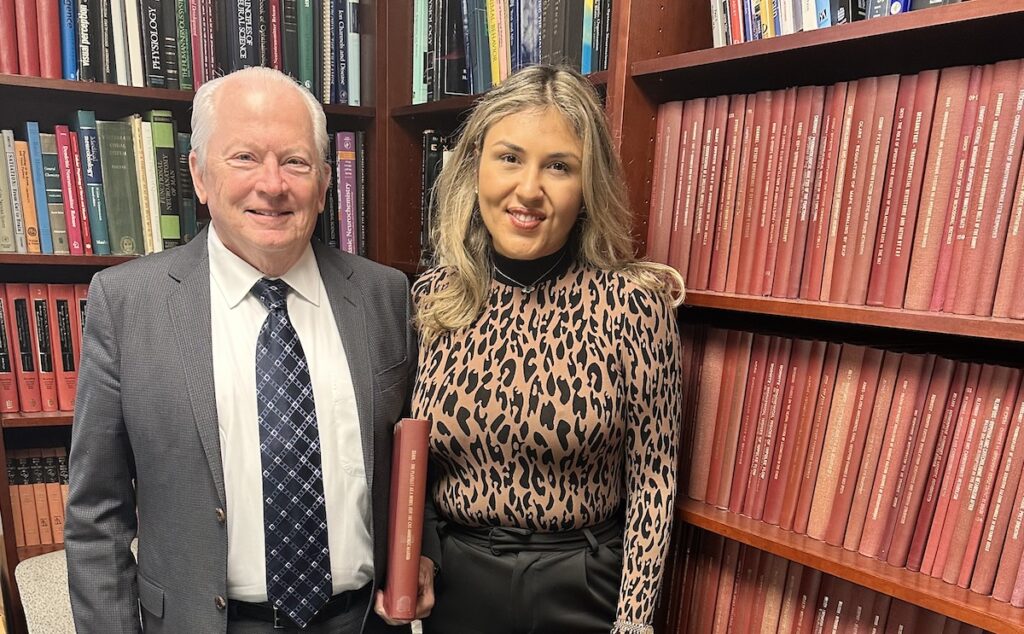After many years of sustained support for cellular therapy research at the University of Chicago Medicine, the Sutherlin Martin family committed $9 million toward the creation of a new multidisciplinary enterprise dedicated to finding novel therapies for cancer. The gift honors the memory of Martha Sutherlin Martin, whose long commitment to philanthropy and personal experience with breast and pancreatic cancer inspired her family.
When Martha received a diagnosis of pancreatic cancer, she and her husband, Todd, sought care at the University of Chicago Medicine. Pancreatic cancer is often difficult or even impossible to treat, but for Martha, a combination of chemotherapy, surgery, and an experimental drug proved effective for several years.
“Martha survived one day short of five years, in the 98th percentile of life expectancy after a diagnosis of pancreatic cancer,” said Todd. “Martha and I talked about our philanthropic priorities and number one became cancer research. We wanted to give where we could do something that really made a difference.”
“I still remember Mom telling me, ‘I know this won’t save me, but it will save someone else.’ It was very much in our mom’s character to care about leaving the world better,” said Alyssa Martin Raine.
Building on a foundation of cellular therapy research
After conversations with leading cancer researchers and clinicians at UChicago Medicine, the Sutherlin Martin family began supporting cellular therapy research in 2021. Cellular therapy teaches a patient’s immune system to target cancer cells and has been very successful against blood cancers in a subset of patients. However, solid tumor cancers, like breast and pancreatic cancer, have proved resistant to cellular therapies.
In recent years, UChicago Medicine researchers across several disciplines have tackled the question of how to improve cellular therapies to make them more widely effective. At the same time, UChicago researchers and leadership have worked to address a related concern—how to bring promising treatments into clinical trial as quickly as possible.
While continuing to focus on the promise of cellular therapies, the Sutherlin Martin family broadened the scope of their philanthropy to support a major initiative dedicated to improving the potential of cellular therapies while shortening the timeline for bringing new treatments to patients.
In 2025, the Sutherlin Martin family made their transformative $9 million gift, which invests in leading-edge infrastructure and harnesses the power of interdisciplinary medical and biological science research across the University of Chicago. The multidisciplinary enterprise is led by AbbVie Foundation Distinguished Service Professor Kunle Odunsi, MD, PhD. “Our ultimate goal is to bring UChicago research out of the lab and into patients’ lives in the form of more effective treatments for the most complex and challenging diseases,” said Odunsi.
Accelerating drug innovation
Crucially, the development of novel therapeutics will bring new treatment options to patients across disease types—for example, a breakthrough in treating pancreatic cancer tumors could offer hope for other hard-to-treat cancers with solid tumors, such as breast and ovarian cancer.
Core facilities, or infrastructure and trained staff available to researchers across multiple disciplines, play a key role in the eminence of UChicago Medicine’s novel therapeutics research program. Ensuring that researchers have ready access to state-of-the-art technology, staff, and research resources is key to attracting and retaining scientific talent.
The Sutherlin Martin family’s gift supports new and unique core facilities that will allow Odunsi and UChicago Medicine to bring together the expertise of faculty in medicinal chemistry, cellular therapy, and live biotherapeutics, as well as to recruit leading scholars to join the enterprise. Working across disciplines allows teams of scientists to shorten the timeline from discovery to delivery.
Two studies funded by the Sutherlin Martin family’s gift will help launch the enterprise and exemplify Odunsi’s vision for this collaborative future of the field. Both studies will follow the Investigational New Drug (IND) process to develop new, leading-edge cellular therapies and make those therapies available to patients.
The IND process, overseen by the FDA, demonstrates that a new therapy is safe and can be reliably produced to high-quality standards. Because of the costs involved, many promising discoveries pause at this stage and some never make it to clinical trials. “The traditional path from discovery to clinical application is slow, fragmented, and risk-laden. This enterprise for IND-enabling studies will accelerate drug development timelines and allow scientists to pursue high-risk research with the potential for high rewards for patients,” said Odunsi.
Speaking to the Sutherlin Martin family’s philanthropic track record, both projects deploy a type of cellular therapy called chimeric antigen receptor (CAR) T-cell therapy against solid tumors. CAR T-cell therapy uses a patient’s own genetically re-engineered T cells to find and destroy cancer cells. The two new studies address the promise that CAR T-cell therapy offers for personalized therapy while tackling the challenges of side effects and long-term effectiveness of the treatment for patients.
The first study, led by Ralph Weichselbaum, MD, Daniel K. Ludwig Distinguished Service Professor, deploys CAR T-cell treatment for solid tumors with the aim of localizing the effect of the treatment on the tumor, thereby avoiding the immune side effects many patients experience with current-generation CAR T-cell treatments.
The second study addresses one of the major challenges in deploying CAR T-cell strategies against solid tumors—sustaining the T-cell attack through cancer’s defenses. Takemasa Tsuji, PhD, and Thinle Chodon, MD, PhD, are developing a version of CAR T-cell therapy that incorporates both a tumor-specific receptor and a protein shown to improve the survival, persistence, and long-term activity of T cells—leading to stronger, longer treatment responses. Both projects having shown promise in laboratory studies thus far, can begin the IND-enabling study process immediately, and could be ready for clinical trial within two years.
When Todd Martin joined the University of Chicago Medical Center Board of Trustees in 2024, he saw an opportunity to accelerate the development and delivery of new therapies. He and his family met with Odunsi and Dean Mark Anderson, MD, PhD, to reimagine the possibilities for cancer research and care.
“This investment was an evolution for us,” said Brittany Martin Graunke. “We thought about how to make the specific research we were funding move faster by helping to build the infrastructure to empower the scientists. We’re a family of entrepreneurs and we’ve been able to see firsthand what can happen when you make an informed, well-researched, intentional bet.”
“I love the strategy,” said Todd. “The less it sounds like something we’ve done before, the more l like it. It’s very ambitious and who else is going to do this but the University of Chicago?”




